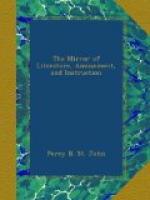Among the Lacedaemonians, epitaphs were only allowed to men who died bravely in battle; and to women, who were remarkable for their chastity. The Romans often erected monuments to illustrious persons whilst living, which were preserved with great veneration after their decease. In this country, according to Sir Henry Chauncy, “Any person may erect a tomb, sepulchre, or monument for the deceased in any church, chancel, chapel, or churchyard, so that it is not to the hindrance of the celebration of divine service; that the defacing of them is punishable at common law, the party that built it being entitled to the action during his life, and the heir of the deceased after his death.”
Boxhornius has made a well chosen collection of Latin epitaphs, and F. Labbe has also made a similar one in the French language, entitled, “Tresor des Epitaphes.” In our own language the collection of Toldewy is the best; there are also several to be found among the writings of Camden and Weaver, and in most of the county histories.
In epitaphs, the deceased person is sometimes introduced by way of prosopopaeia, speaking to the living, of which the following is an instance, wherein the defunct wife thus addresses her surviving husband:—
“Immatura peri; sed tu, felicior,
annos
Vive tuos, conjux optime, vive meos.”
The following epitaphs, out of several others, are worth preserving. That of Alexander:—
“Sufficit huic tumulus, cui non sufficeret orbis.”
That of Tasso:—
“Les os du Tasse.”
Similar to which is that of Dryden:—
“Dryden.”
The following is that of General Foy, in Pere la Chaise:—
“Honneur au GENERAL
FOY.
Il se repose de ses travaux,
Et ses oeuvres le suivent.
Hier quand de ses jours la source fut
tarie,
La France, en le voyant sur sa couche
entendu,
Implorait un accent de cette voix cherie.
Helas! au cri plaintif jete par la nature,
C’est la premiere fois qu’il
ne pas repondu”
The following is said to have been written by “rare Ben Jonson,” and has been much admired:—
“Underneath this stone doth lie
As much virtue as could die;
Which, when alive, did vigour give
To as much beauty as could live.”
To these could be added several others, but at present we shall content ourselves with quoting the two following, as specimens of the satirical or ludicrous:—
Prior, on himself, ridiculing
the folly of
those who value themselves on their
pedigree.
“Nobles and heralds, by your
leave,
Here lie the bones of Matthew Prior,
The son of Adam and Eve,
Let Bourbon or Nassau go higher.”
* * * * *
“Here, fast asleep, full six
feet deep,
And seventy summers ripe,
George Thomas lies in hopes to rise,
And smoke another pipe.”




